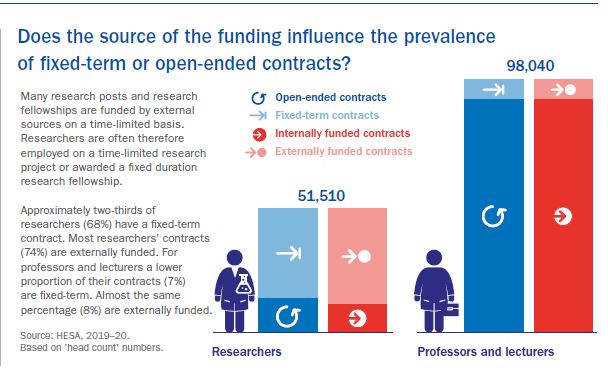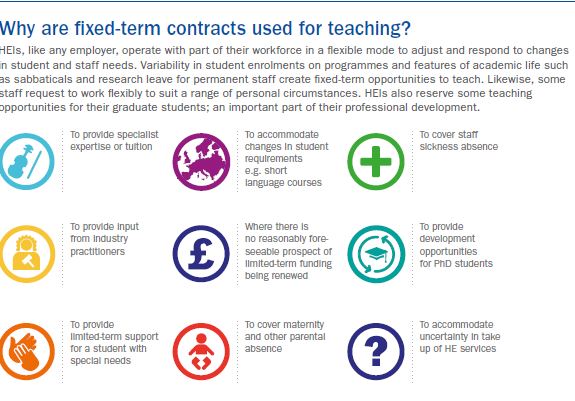Fair employment for all
With around 6,000 colleagues from 180 different countries we offer a diverse and engaging environment in which to work. We aim to provide employment opportunities which meet our business needs and match our employment standards along with our shared University values.
As we aim to make employment more fair for all our colleagues, we are progressing three key priorities:
- Significantly increasing our use of open-ended contracts of employment, recognising that fixed term contracts will be appropriate in a limited range of circumstances, such as cover for study leave and family leave.
- Reducing the University’s use of ad hoc (eClaims) working arrangements, including ensuring all of our regularly timetabled teaching is delivered by colleagues employed on standard contracts of employment.
- Improving working arrangements for Postgraduate Research Students employed as Postgraduate Teaching Associates. We have introduced guaranteed minimum hours contracts and standard paid time allowances for PTAs. HR continue to work with Directors of Faculty Operations to regularly review PTA contracting arrangements to inform the next year’s contracts and ensure they are what PTAs want.
Since May 2020 we have moved more than 674 people previously on fixed term contracts on to open-ended contracts and we continuously review fixed-term contracts in order to move those eligible onto open-ended contracts.
Fixed term contracts are continuously reviewed in line with organisational need and our commitments to the Fair Employment For All (FEFA) initiative. We understand that managers need to sufficiently resource their teams to ensure quality services are delivered which is why, where there is a quantifiable need for additional or continuing support, there is a process in place for managers to make a case to recruit, retain or extend temporarily contracted employees.
Consultation with trade union and student representatives and the Senior Management Group will continue, and the Fair Employment for All Working Group may be reconvened to seek comments and support for proposals as they emerge. Progress will continue to be formally reported to the Joint Committee for Consultation and Negotiation.
You can find more information on previous Vice Chancellor updates regarding fair employment on the Fair Employment VC Messages archive.
Since May 2020 we have moved more than 674 fixed term contract holders on to open-ended contracts and will continuously review other cohorts of fixed-term contracts in order to move those eligible onto open-ended contracts.
Working with our local unions, the University has already taken the following steps to improve contractual arrangements for colleagues.
- introduced business rules to ensure that a temporary contract is issued for longer assignments and that casual employment arrangements are only used for work which is ad hoc and short term.
- agreed with trade unions the circumstances in which fixed term contracts should be used. Each time a fixed term contract is renewed, it is assessed against these standards and considered whether it should be converted to an open-ended appointment.
- introduced the for our contracted staff and for workers engaged on a casual basis.
- moved Postgraduate Students who are employed to teach from casual work arrangements to contracts. Over 470 Postgraduate Teaching Associate contracts were issued in 2018/19, rising to 624 in 2021/22 .
- committed to reviewing the use of occasional teachers with the aim of introducing new contractual arrangements.
- issued a University response to the UCU Claim of September 2019 and, with the agreement of UCU, committed to addressing UCU's concerns.
How fixed term contracts and casual employment are used at the University of Exeter.
At September 2020, 31% of the University’s academic staff (excluding PGR students engaged as Postgraduate Teaching Associates) are employed on fixed term contracts. Fixed term contracts are used only where this is appropriate and in accordance with the University’s agreement with trade unions on the use of fixed term contracts.
In addition to our core staff, other individuals contribute to the University’s education activity through occasional teaching and marking. These individuals are paid on a claims basis because they are engaged for short, specific pieces of work. They include PhD students engaged to enhance the student experience by supporting small group teaching, supporting practicals and demonstrating, and providing support sessions etc. They also include experts in professional fields outside of higher education who contribute to professional development programmes, such as the MBA and degree apprenticeships, by delivering masterclasses or supporting practical assessments. The short-term nature of these assignments mean that contracts are not appropriate.
Each year universities report information to the Higher Education Statistics Agency (HESA) on the use of individuals engaged on ad hoc (eClaims) working arrangements to support education. The table below shows that the proportion of our total academic FTE engaged on this basis has been falling each year as a consequence of the steps the University is taking to reduce the use of casual working arrangements. In 2018/19, the University moved Postgraduate Teaching Associates on a contracted basis and over 470 of our postgraduate students benefited from this change. Departments are also reviewing their use of occasional teachers with a view to offering consolidated contracts. In addition, the University has introduced business rules to ensure that a temporary contract is issued for longer assignments and that eClaims employment arrangements are only used for work which is ad hoc and short term.
| FTE engaged on ad hoc (eClaims) | Proportion of total academic FTE | |
| 2016/17 | 85.0 | 4.3% |
| 2017/18 | 90.8 | 4.2% |
| 2018/19 | 75.5 | 3.3% |
| 2019/20 | 69.8 | 2.8% |
| 2020/21 | 58.9 | 2.3% |
The national picture
The University and Colleges Employers Association (UCEA) has published information from the Higher Education Statistics Agency (HESA) on employment contracts in the higher education sector.
The graphic below shows that the area where we see the higher percentages of fixed term contracts are in research appointments/fellowships and that this broadly mirrors the extent of funding from external sources, which are in general limited term research grants. Many research posts and research fellowships are funded by external sources on a time-limted basis. Researchers are often therefore employed on a time-limited research project or awarded a fixed duration research fellowship. In the main academic population, only a small proportion of staff are employed on fixed-term contracts, again mirroring the extent of external funding sources.
The graphic below explains why institutions use fixed term contracts to support some of their teaching provision.


